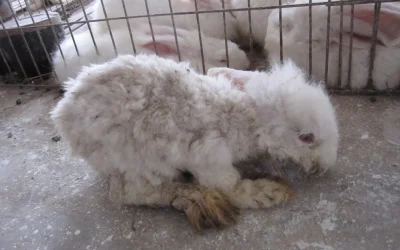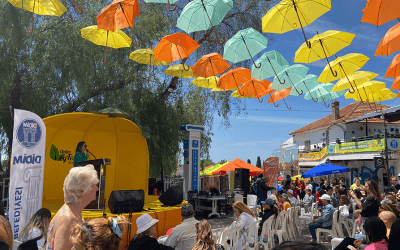Blog
Scientists have echoed calls to halt plans for the world’s first large-scale octopus farm after the shocking and cruel method for killing the animals was revealed by confidential documents shown to the BBC.
Spanish multinational Nueva Pescanova plans to build the world’s first farmed octopus facility in the Canary Islands, with a view to housing and killing around one million octopuses per year. Due to being particularly sensitive to their environments, Octopuses are not currently farmed, but caught from the wild using pots, lines and traps. While these methods result in an equally unnecessary and cruel death by being clubbed on the head by fisherpeople, scientists have warned that the breeding, captivity and method of killing at Nueva Pescanova will prove particularly barbaric.

Nueva Pescanova openly admit they intend to farm the usually solitary creatures in cramped conditions, housing multiple octopuses – an estimated 10 to 15 – for each cubic metre of tank space. Placing territorial animals in unnatural environments commonly leads to stress and extreme behaviours, such as cannibalism, injury and death. Compassion In World Farming, who have examined the octopus farm proposals, estimate that 10-15% of octopuses housed under the plans will die before they even get to ‘slaughter age’. The Spanish multinational also plan to keep the octopuses – usually a species that resides in the dark – in almost constant light. Prof. Jonathan Birch believes that ‘high-welfare’ octopus farming – a term often claimed by Nueva Pescanova – is “impossible” to achieve due to the nature of the species, their needs and natural behaviors.
Aside from the cruel, unnatural conditions planned by Nueva Pescanova, the shocking method of killing these sentient beings has now been revealed. The intensive farm plans to immerse the octopuses in near freezing -3°C (26.6°F) water – essentially, an ice slurry designed to kill slowly. Prof. Peter Tse, a cognitive neuroscientist at Dartmouth University, points out that it would be “very cruel” and should not be allowed, with several studies demonstrating that this method of killing fish results in a slow, stressful death. The World Organisation for Animal Health says using such a method for killing octopuses and other animals “results in poor fish welfare”, with additional organizations proposing a ban on such a practice.
Octopuses are known for being remarkably intelligent creatures and are renowned for their abilities to problem solve, escape enclosures, and even form relationships with the people they meet. They are deemed the world’s most intelligent invertebrate, with incredible abilities rarely seen in other species.
An octopus steals crabs from a fisherman. Source: BBC Earth/YouTube
In a study by Jonathan Birch that reviewed 300 scientific papers on octopuses, strong evidence was found that demonstrated octopuses feel pain and pleasure, leading them to be officially recognised as “sentient beings” in the UK. In addition, a peer-reviewed study in iScience called Behavioral and Neurophysiological Evidence Suggests Affective Pain Experience in Octopus concludes octopuses learn to avoid sites where pain has been inflicted on them, and they display strong negative behavioral changes when faced with pain.
Despite Nueva Pescanova claiming that this form of octopus production will be ‘sustainable’, it is far from the reality. Environmental groups already have concerns over the nutrient-rich water that the farm will be pumping directly into the ocean, and feeding such a large amount of hungry mouths will require huge quantities of fishmeal – made of ground-up fish dragged from the ocean by massive industrial trawlers. For every 3 kg of octopus killed, 9kg of fish must also be killed to feed them, making it a totally unsustainable practice. Octopus farms will further add to the world’s fishing crisis and will continue to drain our oceans of fish and many other species, while destroying delicate marine ecosystems. Ultimately, there is no such thing as sustainable fishing – the best option is to leave octopuses, fishes and all living beings off your plate.
While plans for the world’s largest octopus farm in Gran Canaria continue, we are asking people to take their tourism elsewhere and refuse to support the Canary Islands. Gran Canaria relies heavily on tourism, making your choice of travel or holiday destination particularly important. Sign the pledge to boycott the Canary Islands and let them know that these plans are completely unacceptable, and you won’t be visiting until they are scrapped.
Take Action for Octopuses
1. Boycott the Canary Islands: Join over 73,000+ others and sign the petition against the Nova Pescanova octopus farm and pledge to add them to your No Fly list!
2. Leave octopuses and other animals off your plate! Instead, check out our vegan guide if you need help getting started.
3. Take part in the Tweet storm on Saturday, 25th March 2023.
4. Send an email to Canary Islands asking them to refuse the building permit for Pescanova’s octopus farm

Natasha Maria is a part of the Plant Based Treaty and Climate Save Movement teams. She has an MSc in Sustainable Food & Natural Resources, with a strong interest in climate change, environmental issues, restoration ecology, landscape regeneration and agroecology.
More from the blog
Canadian Plant-Based Nutrition And Lifestyle Medicine Conference – Introduction To Blog Series On Diet Change
By Miriam Porter
7 Reasons Never To Wear Angora
By Miriam Porter
Inspiring change towards a more vegan supply
By Nilgün Engin



